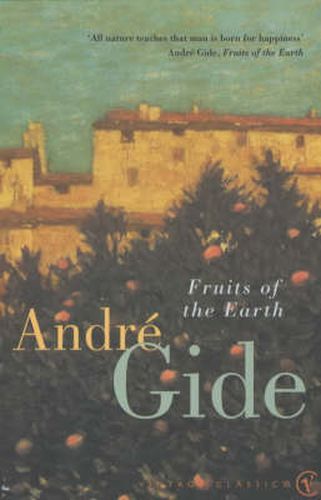Readings Newsletter
Become a Readings Member to make your shopping experience even easier.
Sign in or sign up for free!
You’re not far away from qualifying for FREE standard shipping within Australia
You’ve qualified for FREE standard shipping within Australia
The cart is loading…






Gide wrote Fruits of the Earth in 1897, when he was suffering from tuberculosis. Addressed to the reader, ‘I will teach you fervour’, it is a hymn to the pleasures of life that Gide came so near to losing- travel, touch, hearing, smell, sight and, above all, taste.
During the author’s travels, he meets Menalcas, a caricature of Oscar Wilde, who relates his fantastic life story. But for all his brilliance, Menalcas is only Gide’s yesterday self, a discarded wraith who leaves Gide free to stop exalting the ego and embrace bodily and spiritual joy. Later Fruits of the Earth, written in 1935 during Gide’s short-lived spell of communism, reaffirms the doctrine of the earlier book. But now he sees happiness not as freedom, but a submission to heroism. In a series of ‘Encounters’, Gide describes a Negro tramp, a drowned child, a lunatic and other casualties of life. These reconcile him to suffering, death and religion, causing him to insist that ‘today’s Utopia’ be ‘tomorrow’s reality’.
$9.00 standard shipping within Australia
FREE standard shipping within Australia for orders over $100.00
Express & International shipping calculated at checkout
Gide wrote Fruits of the Earth in 1897, when he was suffering from tuberculosis. Addressed to the reader, ‘I will teach you fervour’, it is a hymn to the pleasures of life that Gide came so near to losing- travel, touch, hearing, smell, sight and, above all, taste.
During the author’s travels, he meets Menalcas, a caricature of Oscar Wilde, who relates his fantastic life story. But for all his brilliance, Menalcas is only Gide’s yesterday self, a discarded wraith who leaves Gide free to stop exalting the ego and embrace bodily and spiritual joy. Later Fruits of the Earth, written in 1935 during Gide’s short-lived spell of communism, reaffirms the doctrine of the earlier book. But now he sees happiness not as freedom, but a submission to heroism. In a series of ‘Encounters’, Gide describes a Negro tramp, a drowned child, a lunatic and other casualties of life. These reconcile him to suffering, death and religion, causing him to insist that ‘today’s Utopia’ be ‘tomorrow’s reality’.